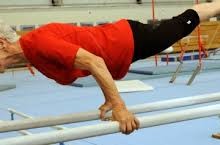 I did not start out as a geriatric care consultant although I have been one for nearly 20 years. I actually started in care management helping injured workers, but it seems that life has come around full circle with an increasingly older work force. Larger percentages of workers are staying on the job beyond what had customarily been the “retirement age” of 65. Yet, today’s older worker does not fit some of our historic expectations.
I did not start out as a geriatric care consultant although I have been one for nearly 20 years. I actually started in care management helping injured workers, but it seems that life has come around full circle with an increasingly older work force. Larger percentages of workers are staying on the job beyond what had customarily been the “retirement age” of 65. Yet, today’s older worker does not fit some of our historic expectations.
The National Council on Compensation Insurance (NCCI) has offered some new research that may surprise a lot of people, especially those who claim that older workers will be more prone to costly injuries. The research showed, for instance, that workers under age 35 had more finger cuts than those over age 35. But workers over age 35 reported more cases of carpal tunnel syndrome or neck injuries than younger workers. This generalized to a lot of what are referred to as repetitive stress injuries like rotator cuff injuries. Even so, the differences were not very great in these latter categories.
There also has been a pervasive notion that older workers’ injuries will be more expensive than those of younger workers. Well, that depends on what you term “old.” It turns out that workers under age 25 do have less expensive injuries with less time lost from work than those older, but it would probably be a stretch to suggest that a 30 year old employee is an “older worker.” Moreover, once a worker hits age 35 and up, the costs of their injuries and the time lost from work are very much on par with much older workers. The researchers also found that the best way to reduce injuries and their costs is not to hire 30 year-olds, but to train workers in safety and to report injuries immediately when they happen.
And there is one more similarity between the older worker and their younger counterparts, and it has to do with family responsibilities. We all expect younger, married workers to have family responsibilities they juggle with their workplace commitments, but older works are also jugglers. In their case, however, they are trying to manage caregiving responsibilities for older parents along with their maintaining on the job performance. And, of course, some of the “younger, older workers” are sandwich generation workers with kids at home or in college as well as parents who need help. No surprise, then, that an increasing number of our clients are not just the individual caregivers, but also the employers for whom they work who are looking to take some of the stress from their “older workers” by offering our services as a resource and support.
Charlotte Bishop is a Geriatric Care Manager and founder of Creative Care Management, certified professionals who are geriatric care consultants, resources, counselors and friends to older adults and their families in metropolitan Chicago. Please email your questions to ccbishop@creativecasemanagement.com.






